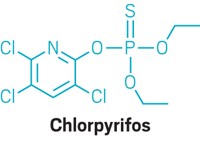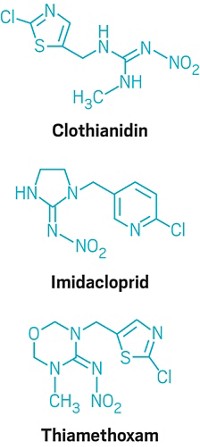Advertisement
Grab your lab coat. Let's get started
Welcome!
Welcome!
Create an account below to get 6 C&EN articles per month, receive newsletters and more - all free.
It seems this is your first time logging in online. Please enter the following information to continue.
As an ACS member you automatically get access to this site. All we need is few more details to create your reading experience.
Not you? Sign in with a different account.
Not you? Sign in with a different account.
ERROR 1
ERROR 1
ERROR 2
ERROR 2
ERROR 2
ERROR 2
ERROR 2
Password and Confirm password must match.
If you have an ACS member number, please enter it here so we can link this account to your membership. (optional)
ERROR 2
ACS values your privacy. By submitting your information, you are gaining access to C&EN and subscribing to our weekly newsletter. We use the information you provide to make your reading experience better, and we will never sell your data to third party members.
Environment
Bee-Linked Pesticide Under Fire
Honeybee Crisis: France acts on study that shows adverse effects of a neonicotinoid on bee behavior
by Melody M. Bomgardner
June 11, 2012
| A version of this story appeared in
Volume 90, Issue 24

A Syngenta pesticide, thiamethoxam, is likely to be banned in France because of concerns about the compound’s effects on honeybees. Thiamethoxam is an active ingredient in the Swiss firm’s Cruiser OSR neonicotinoid pesticide, which is used as a seed coating for the oilseed crop rapeseed.
The proposed ban follows research by French scientists showing that bees exposed to thiamethoxam in nectar have trouble returning to their hive after foraging (C&EN, April 2, page 10). French Agriculture Minister Stéphane Le Foll says he based his decision on a review of the research by the French Agency for Food, Environmental & Occupational Health & Safety.
In that study, entomologist Mickaël Henry at the French National Institute for Agricultural Research, in Avignon, and coworkers affixed radio-frequency ID tags to individual bees and exposed a portion of the bees to sublethal doses of thiamethoxam. They found that exposed bees were twice as likely to die while foraging, implying they had trouble finding their way home. The findings, which appeared in the March 30 issue of Science, suggest the pesticide may contribute to colony collapse disorder in honeybees (DOI: 10.1126/science.1215039).
French regulations require a two-week period during which Syngenta may submit additional evidence about bee health before the ban would take effect, Le Foll says. The agriculture minister adds that he would not wait on a ruling from the European Union, preferring to give clear direction to French farmers before the next rapeseed planting season begins in late summer.
The European Food Safety Authority is also reviewing the French study and other studies that show behavioral effects on bees from neonicotinoid exposure. EFSA says the exposure levels tested thus far are higher than the dose bees would likely encounter in the field; it says more research is needed to examine effects at different exposure amounts and conditions.
In response to the proposed ban, Syngenta points out that Cruiser OSR has been approved and widely used in Europe for nearly 10 years on rapeseed crops. Syngenta says it is “highly critical of the decision, which uses as its pretext a single study that has not been validated and is in total contradiction to observations made in the field—both in France and elsewhere in Europe.”





Join the conversation
Contact the reporter
Submit a Letter to the Editor for publication
Engage with us on Twitter